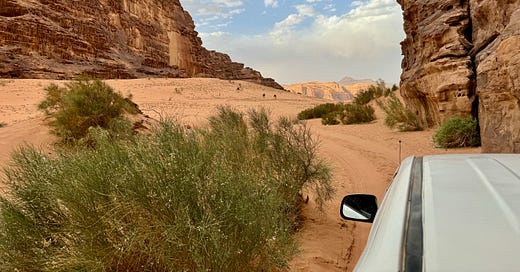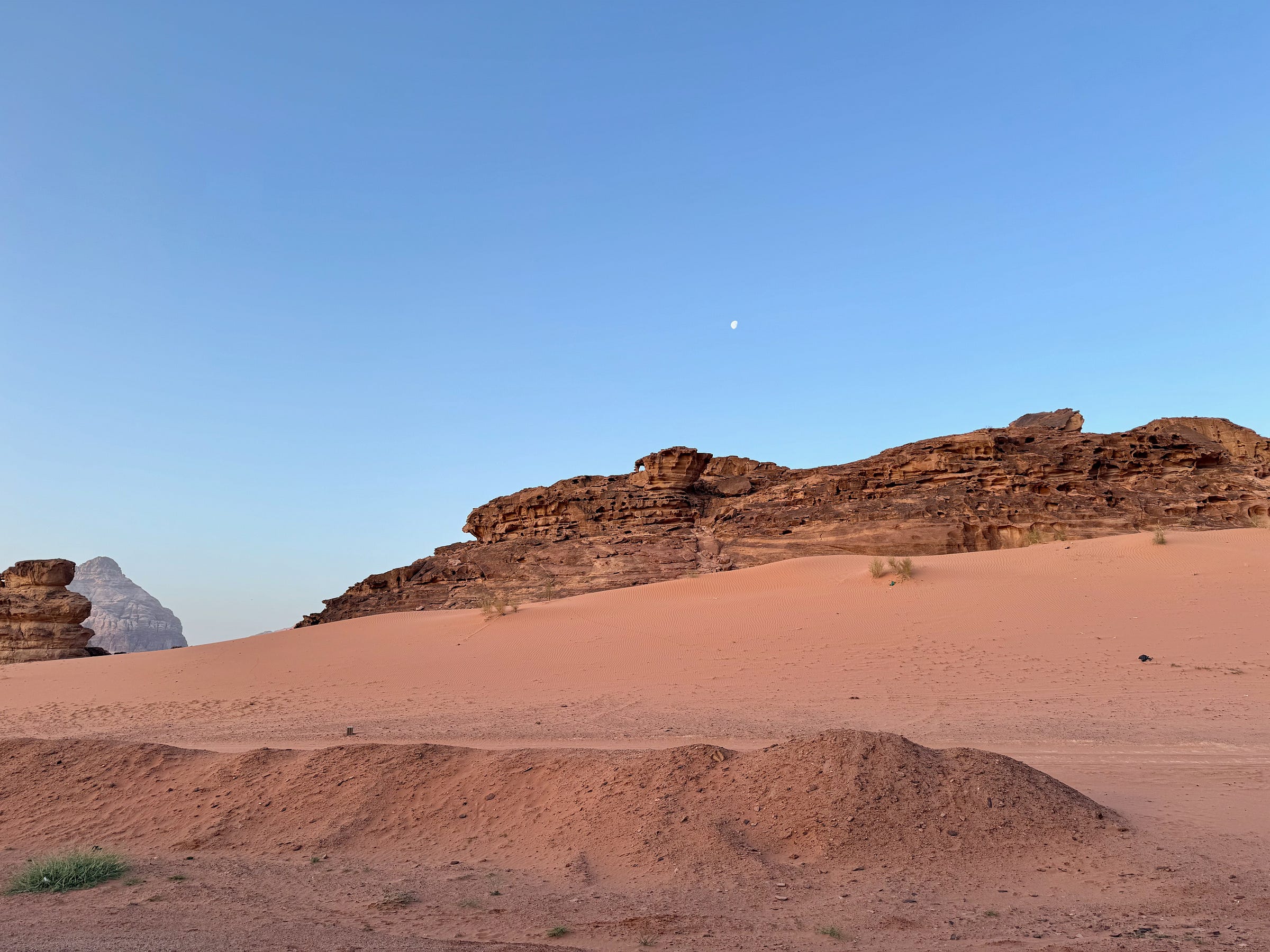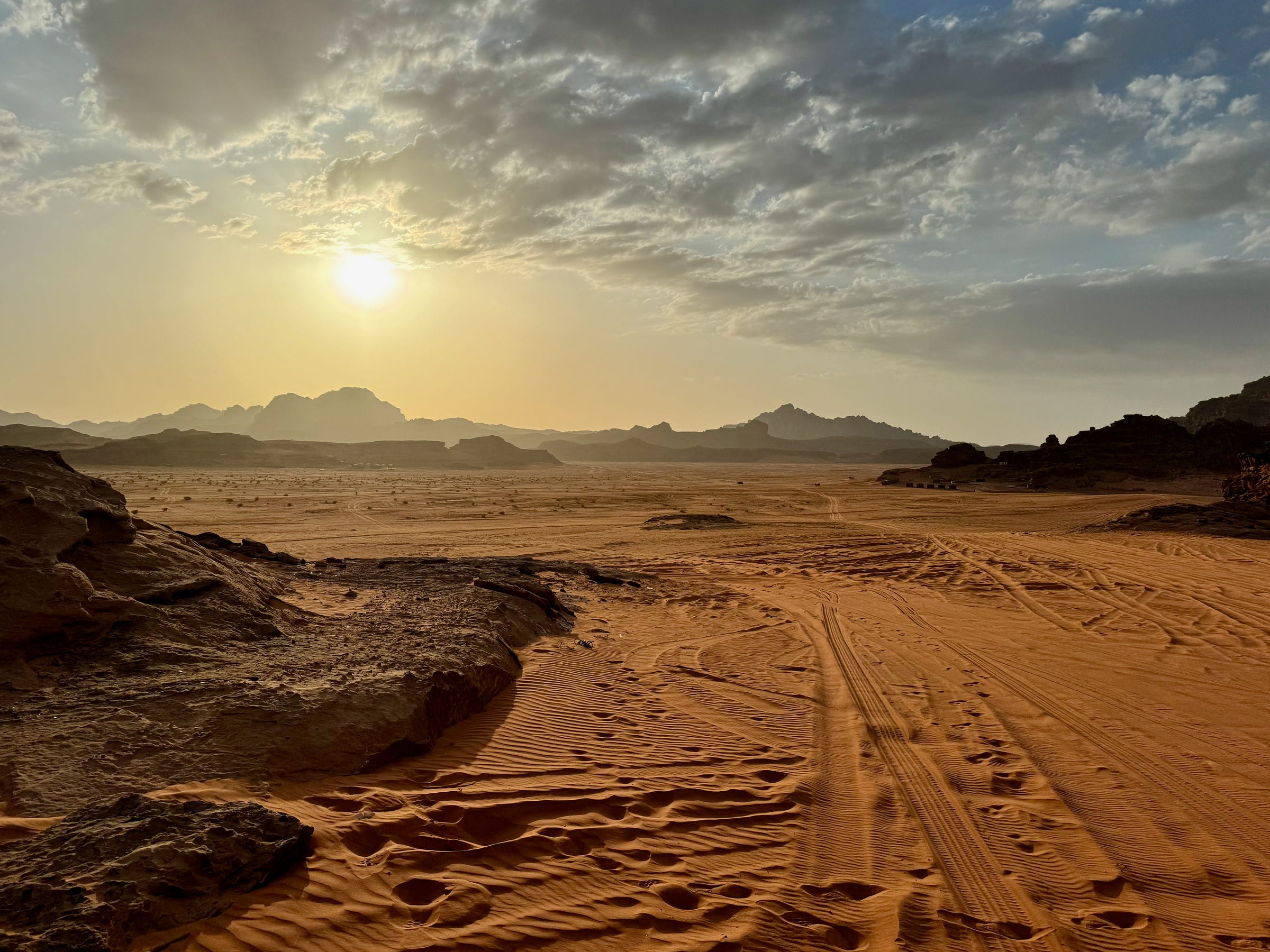How (and Why) to Decolonize Your Travel Mindset
glamor is ephemeral, but a broadened worldview is forever
I’ve never seen the cosmos so clearly as I did in Wadi Rum. Except for the occasional headlights of pickup trucks crossing the pink sand, there was no light pollution out in the wadi—Arabic for valleys cut by ancient rivers, which now remain dry except in the rainy season and feel similar to the arroyos of the American southwest. As my husband, Nick, and I sat around the fire pit in our desert camp, looking up at the sparkling galaxies whose distances we could hardly fathom, it felt like we were the last people on earth.
The camp owner, Hassan, a generational resident of Wadi Rum, noticed that we were his only dinner guests for the evening and invited us to sit with him on cushions of Bedouin weave to smoke shisha. We happily accepted, and we made small talk as we passed the pipe and some Ramadan katayef.
“What countries do most of your guests come from?” I asked Hassan. He took a long, deep pull from the pipe before answering.
“Italy, Germany, France, the U.S.,” he said. “But hardly anyone is coming now. It’s been difficult for us since the start of the war.”
I frowned, but it matched my broader experience in Jordan. At the time, Nick and I had been living there for just two months, and since arriving we’d had the country’s unique tourist attractions—like Petra, the ruins of an ancient metropolis carved into cliff sides, as amazing as anything I’ve seen anywhere—almost entirely to ourselves. While other foreigners had been scared off by the Israel-Hamas conflict, we’d never felt unsafe. I couldn’t help but feel that potential tourists had been spooked by misconceptions about my host country. The war poses little threat here, and while I note that although things got a bit hairy for a while, there has still been little if any spillover of the Israel-Hamas conflict into Jordan. People constantly ask me if it’s safe here, and my answer is always unequivocally yes.
While destinations like Jordan are often erroneously viewed as dangerous, there are a handful of destinations that Westerners (and to an extent, non-Westerners) view not only as safe, but as prestigious. I’m thinking along the lines of London, Paris, Rome, Florence—all nerve centers of former colonial powers, which are still held up as global culture hubs. These places impart a certain social cachet, and as a result, people flock to them while the colonized world is devalued in comparison. (Case in point: how many influencer glamor shots have you seen taken at the Louvre, which houses an untold number of Egyptian artifacts, and how many have done the same at the Egyptian Museum in Egypt, where the Louvre’s artifacts were taken from?)
These assumptions—that certain destinations are safe and worthwhile while others aren’t—are Eurocentrism in action, and they limit our ability to see and experience the wider world. I’m arguing that we should re-examine those assumptions and replace them with facts and openness.
This could bring several benefits. On an individual level, being clear-eyed about our own biases and how they might warp our worldview could open up possibilities for travel to places we had thought were unsafe, or difficult, or uninteresting. And on a systemic level, if we didn’t overvalue certain places and undervalue others, overtourism might be less of a problem, because we’d be less likely to all descend upon and consume the same places every summer.
To be crystal clear, I’m not here to shame anybody over choosing destinations that are too popular or not adventurous enough. Quite the opposite. My goal is to show you that the places that seem scary might not be so scary after all—and when the world no longer seems as scary, you might find yourself wanting to branch out.
Here are a couple questions I like to ask myself before traveling. I’d encourage you to think through them as you plan your next adventure. I hope they leave you feeling empowered to explore more corners of the world.
is the place in question actually hard to get to, or does it just feel hard to get to?
While some places are objectively more difficult to access, a lot of these barriers are mental. Kareem Rahma pointed this out in a recent piece on why we should normalize spending long weekends in Africa:
For some reason, people have no problem visiting cities like Paris, London, or Berlin for a long weekend, but they hesitate at the idea of going to Beirut, Marrakesh, or Cairo. The flight to Cairo is 10 hours direct from JFK on EgyptAir, while flights to Berlin are 8 hours direct. Just two extra hours to see the pyramids—why the hell not?
The difference between flying to Egypt instead of Berlin isn’t a matter of increased effort; it’s literally just sitting still for a couple hours longer. Those two hours could allow you to see the Pyramids, a church carved out of a cave, centuries-old Islamic architecture, and my favorite neighborhood, Zamalek. And while seeing the Bust of Nefertiti in Berlin’s Neues Museum is incredible, you could also see many, many more Egyptian artifacts and ancient sites in their country of origin, rather than in one of the countries that plundered them.
Of course, your mileage may vary depending on where you’re based (there are plenty of cities that have direct flights to Germany and not to Egypt) but if you do a little research into where you can easily travel from home, you might be surprised.
are your beliefs about how safe (or unsafe) places are based in fact, or are they assumptions?
I didn’t know much about the Middle East before I moved here. The only pictures in my head were those that tend to be circulated online: bombed-out buildings, men shooting AK-47s in the air, injured children crying. This is a very human thing—in the absence of more complete information, we tend to fill in the blanks with the images we know, and as the region’s natural beauty and ultra-modern shopping malls aren’t shown on the evening news, the assumption becomes that the Middle East is unsafe for travel.
Let’s do a little experiment. If I were to ask you whether you think France or Jordan is a safer country for travelers, what would you say?
If you said France, here’s some data that might challenge your view.
The Institute for Economics and Peace’s Global Terrorism Index (GTI) ranks countries annually based on the quantity and impact of terrorist incidents within their borders, with the #1 ranked country being the worst impacted by terrorism (you can read more about the methodology and download GTI reports here). In 2024, France was #38 on the list, where Jordan was #75. For context, the U.S. was #30.
Obviously terrorism isn’t the only factor when considering traveler safety. There is also the threat of crime, traffic accidents, and any number of disasters. So let’s check France and Jordan’s respective State Department’s country pages, which take a more holistic look at safety and security (and which I recommend you always, always check before going abroad, per my travel manifesto).
The warning levels are exactly the same. The France page also highlights the risk of petty crime, where Jordan’s doesn’t…and from personal experience, I would say you’re a heck of a lot less likely to get pickpocketed on the streets of Amman than you are in Paris.
At the risk of stating the obvious, I am not telling you to ignore your gut completely, especially not when you’re in a situation that makes you feel unsafe—I’m asking you to question your knee-jerk reactions, seek out facts, and make informed decisions. And of course, some places you probably don’t know much about really are that bad (please, please don’t go to Burkina Faso anytime soon).
It’s also worth noting that making informed decisions about which destinations are safe for you requires self-knowledge. Your ability to notice and get out of bad situations in a given country will vary by your level of familiarity with the language and culture, as well as by your degree of street smarts. It’s important to be honest with yourself about this.
are you dreaming of a particular place simply because it’s what you’ve been exposed to?
I was obsessed with the Madeline books as a little girl. I used to dress up as Madeline for Halloween, I would put on a fake French accent, and I thought the French exchange student we hosted for a week when I was six was the chicest, worldliest person I’d ever met. France, in my mind, was the absolute height of glamor and culture. Nevermind that I was far less exposed to the languages and cultures of other regions—and when I was exposed to them, they weren’t portrayed with the same reverence. I ended up choosing French as my college major and studying abroad there.
I still love France, but looking back, I wonder if I would have made the same choices if I’d come in contact with more of the world at an earlier age, and I think the same principle applies to travel and tourism. We tend to want to go places we already know and think positively about. But there’s a whole world out there that isn’t on our radar and could be just as awesome.
For example, are you dreaming of Rome because you learned about the Roman empire in school and love Italian food? What if I told you that you can see Roman history in Jordan—not to mention much of the rest of Europe and the Middle East—while also visiting the ruins of other ancient empires that are just as interesting but that you’ve probably heard much less about? Or what if I told you that people here think Italian olive oil is basically just yellow water (fighting words, I know) because the oil from this region is so incredible?
Maybe the answer is that you’d still choose Rome. If so, that’s okay! I’m just prompting you to critically examine your desires and ask yourself if they are truly what your heart wants, or if you’re fixating on something because it’s what you’ve been told is cool (or because you are being led around by social media, per Emiko Davies’ post on how overtourism is killing Florence’s dining scene).
are you interested in photo ops, or broadening your worldview?
Much of the West has started to feel same-y, which is a symptom of globalization and foreign investment causing a regression to the mean that Chris Arnade describes as “McEurope”:
a chain of big cities where chunks of each are the same. The branding of the franchises might be a tad different, the scenery a little altered, but these chunks serve up the same bland and drab experience.
You can bet your bottom dollar that in any large city in North America or Europe, you’ll see a lot of the same global corporations you already know. By traveling to places that are less globalized and less touched by foreign investment, you can have an experience that’s further from what you find at home.
Egypt and Jordan, while not untouched by globalization (you can absolutely find Starbucks and Zara in both), feel less homogenous in comparison to what Westerners are used to. That might make your tourist experience appear less glamorous for the ‘gram, but it will do more to broaden your worldview, which has far more enduring value.
Perhaps that last point is the most salient one here: where glamor—a night in a fancy hotel, a flashy social media post—is ephemeral, an expanded mind is forever, and traveling in service of the former comes at the expense of the latter.
I wish I could say that to my younger self. Before moving to the Middle East, I genuinely believed that the “must-see” destinations I’d been fed by glossy magazines were the only ones worth visiting, and that everywhere else was somehow less interesting or less important for a well-rounded person to experience. But the more time I spent overseas outside of those glossy magazine destinations, the clearer it became that my values were out of whack—just because a place isn’t on any “top 10” lists doesn’t mean its history is less rich, or its landscape less dramatic, or its people less engaging.
That’s why I’m now itching to go places like Oman, Namibia, and Georgia, and it’s why I’m so pumped to go on a road trip through Bulgaria later this month. I don’t think anyone I tell about journeying through the Bulgarian countryside will imagine it’s the height of culture or cosmopolitan luxury, but I feel incredibly fortunate to be going somewhere few people visit, where I’ll be exposed to fresh images and ideas, and to new tastes and smells.
There is so much adventure to be had out there, if you’re willing to go look for it. You just might end up smoking shisha under the stars, with a whole expanse of desert and sky all to yourself.
Thanks for reading Caravanserai—I’d love to hear your thoughts in the comments.
Next Tuesday, paid subscribers will get updates on the start of autumn in Jordan (we just had elections here!), reflections on the first few weeks of my sabbatical, and thoughts about how I curate a reading list in preparation for deep travel. Please upgrade here if you’d like to follow along.
See you for our next adventure,
Sam












I'm with you on Oman. It's the Gulf country I most want to visit.
Samantha, THIS is the travel essay I need everyone to read!
When I was little, every time we went to visit Egypt, I was embarrassed that we weren't doing something cooler, like visiting NYC, or spending the summer at a cottage like all my white friends. I had no idea just what an incredible experience it was, and how lucky I was to experience it, until I was older. And so much of that came from what is held up as worthy, cultured, etc.
I listened to a podcast series a few years ago that walks through Prophet Muhammad's life. One of the interesting and unexpected benefits I got was actually learning about the Sassinid (my spelling is probably wrong) empire in Persia, which I'd never heard of at school or elsewhere. And learning that a major hub in the Roman empire at that time was actually Damascus. If I, a woman of Arab descent, didn't know this, how likely is it that the average person in Europe or North America has any idea of this?
Hard agree on the whole essay. Thank you for writing it.